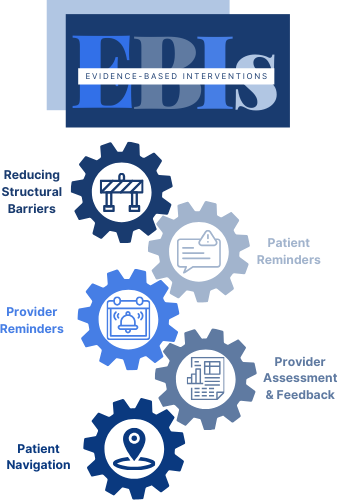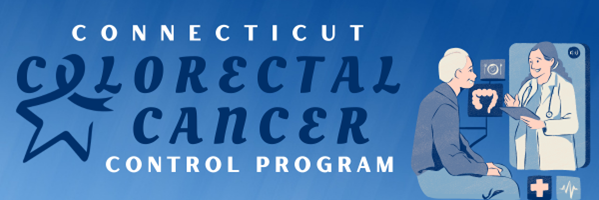Think about YOURSELF.
Think about SOMEONE YOU LOVE.
- In 2024, there will be 1,580 new cases of colorectal cancer in Connecticut that, if detected early, are treatable.
- The rate of new colorectal cancer cases increased by 12.5% from 2020 to 2021 in Connecticut.
- Black males living in Connecticut are more likely to be diagnosed and die from colorectal cancer when compared to other races and sex.
- From 2020 to 2021, colorectal cancer cases among Connecticut residents younger than 50 increased by 24%.
The Connecticut Colorectal Cancer Control Program (CCRCCP) partners with select health systems and clinics statewide to achieve measurable improvements in colorectal cancer screening rates as a result of implementing evidence-based interventions like provider and patient reminders to get screened. This approach is population-based, impacting all Connecticut residents regardless of their insurance status or ability to pay. A limited amount of grant funds is also used to support no-cost diagnostic follow-up for those who qualify.
Connecticut Colorectal Cancer Control Program (CCRCCP)
The Centers for Disease Control and Prevention (CDC) has funded the Connecticut Colorectal Cancer Control Program to increase colorectal cancer screening rates among people aged 45-75 years old. The program does this by working with clinics, hospitals, and other health care organizations to implement and strengthen strategies that have been shown to increase colorectal cancer screening called evidence-based interventions. In addition, grant funds are used to provide no-cost follow-up diagnostic colonoscopies for those eligible participants with a positive screening test. A grant requirement is that these funds cannot pay for the initial screening but can be used to pay for the follow-up colonoscopy.
rates among people aged 45-75 years old. The program does this by working with clinics, hospitals, and other health care organizations to implement and strengthen strategies that have been shown to increase colorectal cancer screening called evidence-based interventions. In addition, grant funds are used to provide no-cost follow-up diagnostic colonoscopies for those eligible participants with a positive screening test. A grant requirement is that these funds cannot pay for the initial screening but can be used to pay for the follow-up colonoscopy.
No-Cost Follow-Up Diagnostic Colonoscopy Service

The Department of Public Health (DPH) directs the program in collaboration with certain Connecticut health care systems and clinics. At each of these health care facilities, you may be eligible to receive a fecal screening test, not paid for by grant funds. If the patient receives a positive screening result, they are referred to a Gastroenterologist (GI doctor) for a follow-up no-cost diagnostic colonoscopy, paid for by CDC grant funds.
Who Can Enroll?
To be eligible to receive a no-cost follow-up diagnostic colonoscopy, you:
- Must have a positive screening test for CRC
- Must be aged 45 -75 years old
- Must be at or below 250% of the Federal Poverty Level (see below)
- Have no health insurance (uninsured) or,
- Have health insurance with a high deductible of $1,000 or more
Please note that a brief medical history and physical exam will be conducted to determine if you are medically eligible to undergo the colonoscopy procedure.
FEDERAL & STATE INCOME ELIGIBILITY GUIDELINES
(Based on 250% of the 2024 Federal Poverty Guidelines)
*Household gross income must be less than or equal to the following:
|
Family Size |
Annual Income |
Monthly Income |
Biweekly |
Weekly Income |
|
1-person family |
$37,650 |
$3,138 |
$1,448 |
$724 |
|
2-person family |
$51,100 |
$4,258 |
$1,965 |
$983 |
|
3-person family |
$64,550 |
$5,379 |
$2,483 |
$1,241 |
|
4-person family |
$78,000 |
$6,500 |
$3,000 |
$1,500 |
|
5-person family |
$91,450 |
$7,620 |
$3,517 |
$1,758 |
|
6-person family |
$104,900 |
$8,741 |
$4,034 |
$2,017 |
|
7-person family |
$118,350 |
$9,862 |
$4,551 |
$2,275 |
|
8-person family |
$131,800 |
$10,983 |
$5,069 |
$2,534 |
|
9-person family |
$145,250 |
$12,104 |
$5,586 |
$2,793 |
|
10-person family |
$158,700 |
$13,225 |
$6,103 |
$3,051 |
|
For each additional family member add: |
$13,450 |
$1,121 |
$517 |
$259
|
Contact Us or the Program Center in Your Local Area
Contact Us by Email:
To learn more, send your first name with your phone number or email address to the Connecticut Early Detection and Prevention Program (CEDPP).
Contact Us by Phone: The Connecticut Department of Public Health, 860-509-7804
Call Any of the Following Locations:
If you are interested in receiving a no cost diagnostic colonoscopy, contact one of the participating health care facilities below:
| Town | Location | Phone |
| Bridgeport | Bridgeport Hospital | 203-384-3392 |
| Danbury | Nuvance Health/Danbury Hospital | 203-739-4770 |
| Hartford | Hartford Hospital | 860-972-3078 |
| New Haven | Cornell Scott Hill Health Center | 203-503-3000 |
| New Haven | Fairhaven Federally Qualified Health Center | 203-777-7411 ext. 5011 |
This list does not include of all clinics that provide these services.
There many be a clinic closer to you.
Call the location closest to you and they will direct you to the closest clinic.
| For more information, please see the CEDPP brochure (English, Spanish, Portuguese, LGBTQ+). |
Evidence-based Colorectal Cancer (CRC) screening practice improvements
The CRC screening initiative is focused on improving CRC screening rates by implementing one or more of the priority evidence-based interventions listed in the Guide to Community Preventive Services (the Community Guide) that includes the following practice improvements:
- Provider reminders: Reminding providers to refer their patients for CRC screening

- Client/patient reminders: Reminding patients that they are due or overdue for CRC screening
- Provider assessment and feedback: Providing assessment and feedback reports for providers on their performance related to screening patients for CRC
- Reducing structural barriers: Diminishing non-economic burdens or obstacles that make it difficult for people to access CRC screening (e.g., sending patients a fecal screening test via mail so they don’t have to come into the clinic, providing language interpreters, modifying clinic hours to meet patient needs)
Participating health systems and/or clinics may also engage in quality improvement processes to support their efforts to start or improve the CRC screening practice improvements they select. Quality improvement processes are systematic, continuous actions that lead to measurable improvement in services and patient health.


